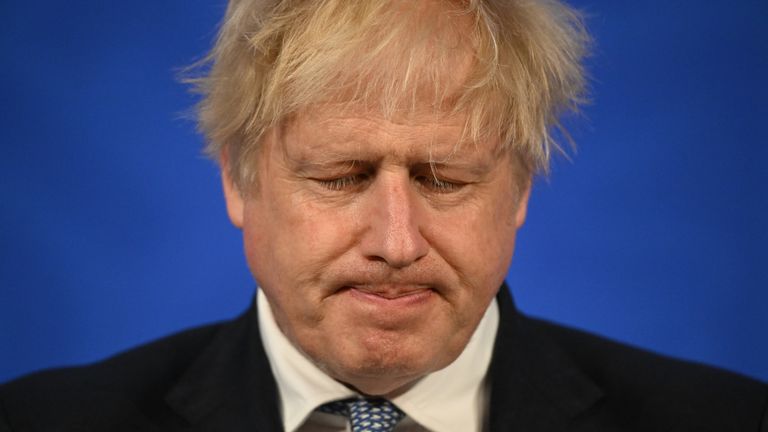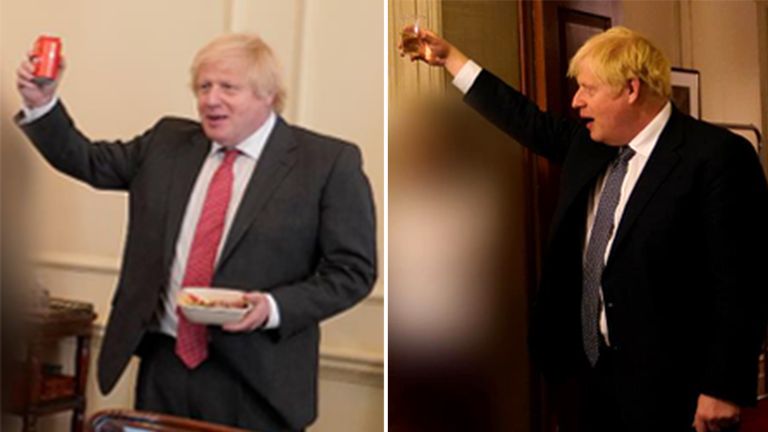[ad_1]
The trickle of MPs publicly calling for Boris Johnson to resign is now a modest stream and gathering pace.
And the dangerous thing is, the rebellion feels uncoordinated and therefore unpredictable.
With number of MPs openly questioning the prime minister‘s authority at 40, senior Conservatives are braced for the possibility of a vote of confidence as soon as next week.
PM ‘in real trouble’ and ‘could face confidence vote next week’ – follow live updates in our Politics Hub
The number of letters calling for his resignation is only known to Sir Graham Brady, the backbench chair who collects them, and he will inform the PM if the threshold is met.
Veterans of the Theresa May period will remember there were weeks of reports that the number of letters was in the “low-40s” and rising, before it was actually reached.
To remind you of the rules, 15% of Tory MPs – currently 54 – must submit a letter to trigger a no confidence vote.
Then the PM must secure the support of half of Tory MPs – 180 – to stay in post.
Read more: Which Conservative MPs have called on Boris Johnson to quit?
But two interventions over the past 24 hours are particularly significant in showing how opinion appears to be shifting in the light of the Sue Gray report.
Andrea Leadsom, stalwart Brexiteer and former supporter of Mr Johnson, has written to her Northampton constituents to blame the PM for failures of integrity at the heart of government.
She wrote: “I am determined to be clear about my views as a matter of personal integrity – the conclusion I have drawn from the Sue Gray report is that there have been unacceptable failings of leadership that cannot be tolerated and are the responsibility of the prime minister.
“Each of my Conservative MP colleagues and I must now decide individually on what is the right course of action that will restore confidence in our government.”
The other is from former attorney general Jeremy Wright, a lawyer who wrote a carefully considered 2,000-word analysis of the situation – concluding that he could not know whether the prime minister knowingly misled parliament but concluding that he should now resign regardless anyway for the tone he had set for others and damage to government institutions which has followed.
His reasoning may well strike a chord with others, who would otherwise have waited for by-elections next month and the Privileges Committee inquiry later this year.
Multitude of reasons behind MPs’ unhappiness
From the May-ites to the Brexiteers; 2019-ers to veterans, Lib Dem-facing and Labour-facing; the rebels are not the coordinated faction which Theresa May had to contend with from the Brexiteer European Research Group; but are acting alone and for a variety of grievances.
A former cabinet minister says the Leadsom intervention shows that the right of the Conservative party is discontented by what they consider the chancellor’s “un-Conservative” decision to give all families £400 to cope with higher energy bills – believing he should have cut taxes instead.
“For £15bn, we haven’t had much political impact,” the senior Tory said.
There’s anger from various quarters about party management.
The fact that MPs were ordered to vote down Labour’s windfall tax a week before the government announced one of its own, has put backs up.
What some see as the prime minister’s triumphalist tone after the publication of the Sue Gray report – saying he had been “vindicated” – has also rankled.
But what has really focused minds is polling suggesting that the Tories are on course to lose their majority, and that the great campaigner Boris Johnson may have lost his 2019 Midas touch.
As one MP with a small majority and yet to go public put it to me: “The prime minister is in more danger than he thinks he’s in, and more danger than the whips realise.”
Policies such as bringing back imperial measurements and axing the civil service fast stream have hardly improved the mood with MPs questioning “whose votes they are intending to win with this”.
Tories facing the Lib Dems in the south and South West are now deeply concerned about holding onto their seats.
Expect a lobbying operation ahead of any vote
Some of the PM’s allies are confident that he would win a confidence vote, and then be safe until the next election.
They point out that there is no obvious successor waiting in the wings, and that Sir Keir Starmer’s Labour party still has a mountain to climb to win a majority; both of which are true.
If the threshold is met, MPs are expecting a lobbying campaign from Downing Street with the prime minister expected to offer jobs, knighthoods, trade envoy roles and any other inducements which could win wavering MPs round.
He will tell them he can put partygate behind him and deliver on promises to level up.
And for the rebels there is a high risk of failure: Theresa May, of course, won a confidence vote in December 2018, although she went on to stand down months later after her Brexit strategy failed.
Conservatives who have publicly and privately criticised the prime minister are clear that there would be a wide-open field in a future leadership contest – and no-one knows who would win.
Jeremy Hunt has indicated he may want to run again, and some of the low-tax Right of the party are looking to cabinet ministers such as Liz Truss.
If a vote of confidence goes ahead, it would be a sign that enough MPs are prepared to gamble that any other leader would be preferable. No-one, including the prime minister, knows what decision they will make.
[ad_2]



